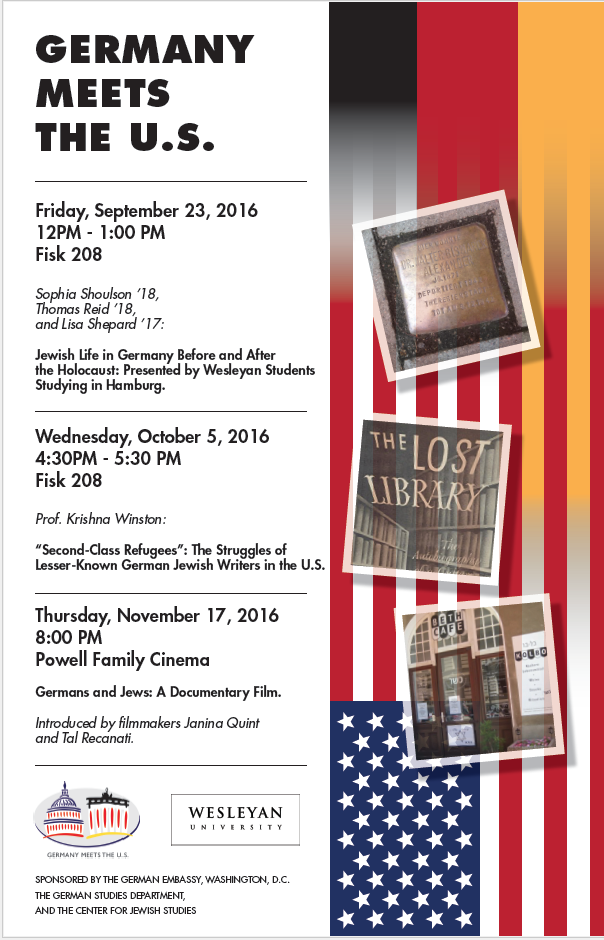Academic Events
Elisabeth Lauffer, ‘07 to speak at WesFest
Liz double majored in COL and German Studies. She spent her sophomore spring semester in Regensburg,
Germany. Her senior thesis was the translation of Russian émigré humorist Vladimir Kaminer’s The Trip to Trulala, which she completed under the mentorship of Professor Krishna Winston. Liz then moved to Germany, where she spent a year at Hamburg University through a DAAD Study Scholarship, before relocating to Berlin.
In 2011, Liz returned to the States to complete her Master’s in Education at the Harvard Graduate School of Education. Since then, she has dabbled in various educational pursuits (including teaching in and directing the Middlebury Interactive Summer German Academy) and committed herself to literary translation. In 2014, Liz was awarded the Gutekunst Prize for Emerging Translators through the Goethe Institute New York. In 2016, her first full-length book translation, Animal Internet by Alexander Pschera, was published with New Vessel Press. Liz is currently under contract for two titles with the MIT Press and works as Production Editor at Chooseco, publishers of the Choose Your Own Adventure children’s book series.
“Second Class Refugees”: The Struggles of Lesser-Known German Jewish Writers in the U.S.
xxxxx
Professor Krishna Winston’s talk “Second Class Refugees”: The Struggles of Lesser-Known German Jewish Writers in the U.S. is the second event in our series “Germany Meets the U.S.” and will take place Wednesday, October 5th, from 4:30-5:30 p.m., in Fisk 208. Refreshments will be served.
Professor Winston will talk about German Jewish writers who had been quite well known in Germany but who struggled to establish themselves professionally when they emigrated to the U.S. and thus endured great economic and emotional hardship. Among them are Mehring, Hans Sahl, Curt Riess, and Heinrich Eduard Jacob. Her parents, the distinguished translators Richard and Clara Winston, knew these authors personally and translated their works into English. Krishna will draw on her collection of letters exchanged between these refugees and her parents as well as on her own memories.
Nathan the Wise

This was followed by a lovely meal at the Loreley Biergarten.
German Events this Fall
 Also see Olivia Drakes article on our events.
Also see Olivia Drakes article on our events.
“The Wallpeckers” Professor Krishna Winston introduces Günter Grass’s novel “Too Far Afield”
……..
Please join us for our fourth and last lecture in the German Department’s fall series on commemorating the 25th year of the fall of the Berlin Wall, this Thursday, November 6, in the Downey House Lounge at 4:15 PM. In her talk, “The Wallpeckers,” Krishna Winston introduces and reads from Günter Grass’s novel, Too Far Afield.
Refreshments will be served.
NPR -Journalist Bellamy Pailthorp ’89 will speak about “The Fall of the Wall — An Eyewitness Perspective.”

“25 Years: Fall of the Berlin Wall” is co-sponsored by the German Embassy in Washington D.C. All events are free of charge and open to the public. For more information call 860-685-3359.
Sarah Wiliarty will speak on The Fall of the Wall – A Political Perspective
Please join us for the first lecture in the German Department’s fall series on commemorating the 25th Year of the  Fall of the Berlin
Fall of the Berlin
Wall.
This Wednesday, October 15 in FISK 210 at noon, Prof. Sarah Wiliarty will speak on “ The Fall of the Berlin Wall – A Political Perspective.”
Refreshments will be served.
“25 Years: Fall of the Berlin Wall” is co-sponsored by the German Studies Department and the German Embassy in Washington D.C. All events are free of charge and open to the public. For more information call 860-685-3359.
Hannah Arendt, directed bu Margarethe von Trotta
Please join us for the screening of Hannah Arendt, directed by Margarethe von Trotta.
September 27, 8:00 p.m. at the Goldsmith Family Cinema
Introduction by Leo Lensing (Professor of German and Film Studies), followed by a Q&A with Pam Katz P ’16, the film’s co-screenwriter















